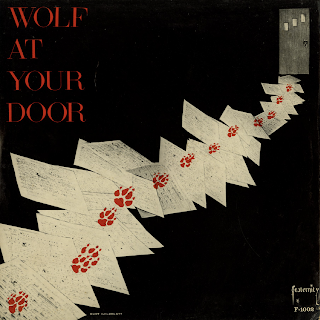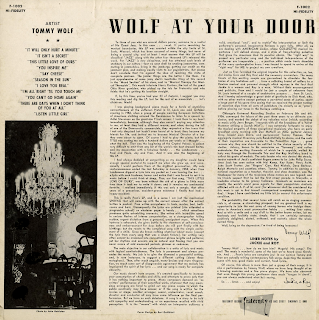Wolf At Your Door
Wolf At Your Door
Tommy Wolf
Cover Design: Burt Goldblatt
Back Cover Photo: John Goldstone
Fraternity Records - Cincinnati, Ohio
F-1002
From the back cover: To those of you who are several dollars poorer, welcome to a recital of No Coast Jazz. In this case... vocal. If you're searching for musical boundaries this LP was created within the city limits of St. Louis, Missouri, which has been accused of many things but never of being a coastal city; and at least I must assume that this LP will be classified as "JAZZ" along with the other four thousand LPs released this week. For "JAZZ" is now ubiquitous, and has attained such levels of snobbery in our culture I fear we soon shall be smoking jazzarettes, commuting in jaamobiles, living in the jazz burgs, getting our credit on the jazzmen plan, and making weekly visits to our psyjazzitrists. But please don't conclude that I'm against the idea of reaching this state of complete jazziness. The jazzier things are, the better I like them. I'm just apprehensive of some jazzy clerk's inevitable filing of this record in the "Mood Section" of his store, next to "Musical Therapy for Musical Therapists". This would infuriate Harry Carlson, the last of the great Ohio River gamblers, who picked up the tab for Fraternity and who thinks that he's getting his bourbon straight.
If, by this time, you've had your fill of rhetoric, I suggest you stop this reading and dig the LP; but for the rest of us masochists... let's cliche on. Mush!
I was playing background piano music for a horde of stumbling conventioneers at the Jefferson Hotel in St. Louis one cold October evening in 1952, when a group of people wearing European imitations of American clothing entered the Rendezvous to listen to a speech by Adlai Stevenson on the giant-size 7 inch screen. I took them to my heart immediately, because although they also weren't paying any attention to me, at least they had a different reason; and when, during the lull of one of the Democratic commercials, they requested a few tunes that I not only despised but hadn't even heard of to boot, they became my friends for life, and invited me to become Musical Director of a bar they were about to open. Of course I had to play the piano, but the TITLE was costing me only a hundred dollars per week; so I thought... what the hell. That was the beginning of the Crystal Palace, a saloon very difficult to omit from any list of the world's ten best dressed boîtes, and my association with a fabulous family... the Landesman... Fred and Paula, Jay and Fran. And it was also the beginning of this LP.
I had always dabbled at songwriting so my daughter would have enough special material to support me when she grew up, and occasionally I would perform them at the slightest provocation. My solo venturesomeness ended that last Saturday in January, 1953, when Fran Landesman slipped a lyric into my pocket as I was leaving the bar... a lyric with such freshness, humor and satire that I was forced to set it to music before I could think of sleep. Thus, our first song, "This Little Love Of Ours", was born without the aid of a piano in little more time than it took me to write it down; and it remains my sentimental favorite. I realized immediately, if this was only a sample, that after years of precarious, accident-prone existence I finally had had a happy accident.
This is really Fran's LP, and in a sense I am just the mechanical UNIVAC that will come up with the correct answer after the correct button is pushed. Fran writes everywhere: in taxis, movies, bed, bathrooms and bars. Consequently the lyrics are printed (she attended a progressive school) on whatever paper is handy... which sometimes produces quite astonishing souvenirs. She writes with incredible speed in curious flashes of intense concentration, as a stenographer taking sudden, urgent dictation from a personal, omnipotent muse. When this hysteria is exhausted, she gives battle to the stammers of self-conscious-birthing:; but she reacts to the completed song with the simple excitement of a child. Since she knows nothing whatever about music (except the lyric from every song that was a smash failure), her writing very often cannot be crammed into conversational phrase lengths and patterns; yet her rhythms and accents are so natural and flowing that you are never aware of odd measured periods, phrases and cadences.
The main object in our collaboration is a unity of lyric and music with logical comfortableness. The lyric is paramount and always precedes the music. My job is to give the diamond a purposeful setting, and, in rare instances, to suggest, a different cutting (damn these metaphors). Then, after much anguish, many bruises and more vituperation, we reach some sort of disagreeable agreement that my melody has imprisoned the spirit of her lyric... and our song is ready for complete obscurity.
Our music doesn't hate anyone. It's created specifically to increase your consumption of chuckles and chills, and attempts to prove only that it has nothing important to prove. Many composers demand an "as written" performance of their sanctified works, whatever that many mean, since arrangers are hired to bring out any piano copies to which the public eventually may have access; or if the song is written for the movies or stage, another arranger, scorer, orchestrator, vocal coach, director and conductor all may have some influence on the final performance. But we have no such delusions. A song is a story to be told with sympathy and understanding, or an experience recalled with vivid perception. It is the "mean" with which an interpreter achieves a valid, emotional "end", and to restrict the interpretation or limit the performer's personal, imaginative horizons is pure folly. After all, we are dealing with AMERICAN Lieder, whose COLLECTIVE musical importance I will defend always, and a style of free-wheeling pulsation that gives the American Lied its peculiar charm. The "right way" to present any particular song and the individual independence of the performer are inseparable... a position which made ironic shambles of the many contemplative hours I was forced to spend to arrive at the "right way" for ME to project my own creations.
Just as Fran furnished the original impetus for this collection, so, too, did Jackie Cain and Roy Kral add the necessary momentum. The many facets of this exciting couple are guaranteed to stimulate the fantasies of any fastidious cult... from a rollicking brand of raillery to a flawless musical and personal strength which rejoices in the fact that Jackie is a woman and Roy is a man. Without their encouragement and publicity, Fran and I would be just a couple of unknowns from St. Louis instead of a couple of unobtrusive paupers... from St. Louis. And I herby acknowledge a great debt of gratitude to Dick Noel, who, with no other motive except perhaps a perverted sense of justice, spent a large part of his spare time seeing that we received the proper number of rejection slips from all sort of publishers (to classify us as "pros") before placing our tunes in the Buckeye catalogs.
Chicago's Universal Recording Studios on February 5th and 6th, 1956, converged the labors of the past three years to an ultimate conclusion, and marked the debut of my voiceless voice (which, according to music critic Jerry Berger, "resounds with all the brassiness of a Velvet Hammer striking a Scotch Mist"). I was extremely fortunate to enjoy the musical empathy of three exceptional musicians who have an early breakfast every morning with Don McNeil on ABC: guitarist Johnny Gray, bassist Jack Shirra and percussionist Tommy Thomas. Their aggregate musical itinerancy puts Rand-McNally to shame, and the roots of their inspiration are traceable puts Rand-McNally to shame, and the roots of their inspiration are traceable to the Paleolithic Age... good reasons why they now should be entitled to the choice security of the studios. Johnny, known to his associates as "Screamy", and rather understates the exciting fireworks of which he is capable, wailed his lusty way through the Dardanelle Trio and the Ray McKinley band to collect his quota of medals. The only leader who was denied the steady, tender warmth of Jack's confident fingers seems to be John Philip Sousa, since Jack has seen action with Hal Kemp, Kay Kyser, Percy Faith, John Scott Trotter, Joe "Fingers" Carr, Red Nichols, Dave Barbour, Ralph Merterie and countless others. Tommy, in addition to earning a national reputation as a teacher, theorist, and show drummer, was the timekeeper for many of the musicians whose names are now legend; and his friends suspect to his groovy funkiness. Inasmuch as musicians similar afflicted with an A.F. of M. card (for whosoever shall be considered hip this week is apt to find himself recategorized completely by next Sunday), I hope I have contribute my little bit to correct this unfortunate condition.
The probability that several tunes will catch on as singing commercial is, of course, a stimulating prospect; but my greatest thrill is my opportunity to join the vast army of unsung heroes who indulge themselves in America's most provocative hobby... writing liner notes. And so with a smile and a cap d'off to the better known writers, let me fearlessly and foolish state, simple, that I am certainly extremely positively delighted, elated, enthused, and ecstatic about the whole durned thing.
Well, bring on the depression; I'm tired of being lonesome! – Tommy Wolf
It Will Only Hurt A Minute
It Isn't A Secret
This Little Love Of Ours
You Inspire Me
Say Cheese
Season In The Sun
I Love You Real
I'm All Right 'Til You Touch Me
You Can't Go Home Again
There Are Days When I Don't Think Of You At All
Listen Little Girl


No comments:
Post a Comment
Howdy! Thanks for leaving your thoughts!